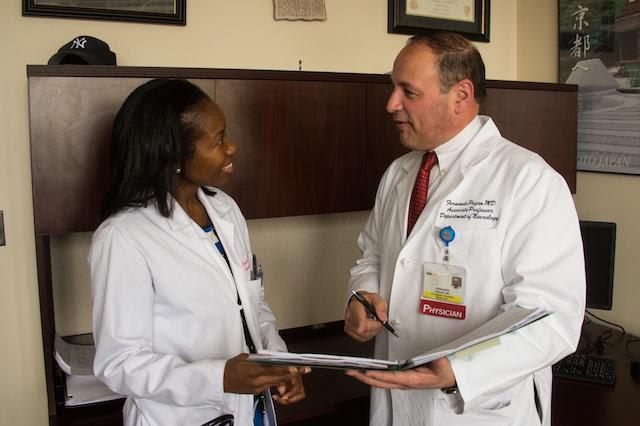Patients Drive Support Of Parkinson’s Fellowship Program

Posted in GUMC Stories | Tagged brain, brain research, Fund a Fellow Program, mind, Parkinson's disease
March 2, 2015 — Twelve years ago, Rick Schena, a United Airlines pilot, felt something amiss in the body he has always been so in tune with — the onset of tremors, some rigidity, and issues with processing vision. Six years ago he was diagnosed with Parkinson’s. This was devastating to the speed junkie who also races cars and go-karts.
Schena went to his general practitioner in D.C. When the doctor said there was nothing he could do, Schena visited a neurologist.
“It was a terrible experience. It was clear he didn’t know anything about Parkinson’s disease. I walked out of there,” he says.
A friend of his with the same disorder recommended that he see Fernando Pagan, MD, director of Georgetown’s Movement Disorders Program.
“Dr. Pagan turned my life around,” Schena says. “The treatment he and his team provided was so incredible. I left feeling a lot of hope — and my health has since remained stable, although I know this disease is a formidable enemy.”
Janis Buchanan felt the same way about the Parkinson’s disease care Pagan gave her husband. When Schena and Buchanan happened to meet, they decided they wanted to pay it forward—to do something for the physician that is doing so much for them.
Not Enough Specialists to Fill the Need
When Schena and Buchanan sat down to lunch with Pagan in 2013, they discovered some alarming facts — only 25 percent of Parkinson’s patients nationwide see a movement disorder specialist, because there are so few of them.
These specialists treat a variety of disorders that all feature involuntary muscle movement or tics as seen in Parkinson’s and related disorders, including Huntington’s disease, dystonia, ataxia and Tourette’s syndrome.
“In fact, there are many states that don’t even have such a specialist,” Buchanan says. “And we all know from experience, it is especially important for Parkinson’s patients to receive treatment from a specialist because the disease symptoms vary from person to person.”
Then they learned that Pagan had personally funded and trained 16 fellows as movement disorder specialists.
Little Exposure to Neurological Disorders
Since 2005, Pagan has largely used research grant funds meant to support his time to support the two-year, $160,000 fellowships.
“The lack of movement disorders specialists is a problem across the country. There is a big demand for these physicians, but there aren’t enough fellows,” Pagan says. “Training hasn’t caught up with this specialty. Even today, you can easily graduate from a medical school without ever taking care of a Parkinson’s patient or even rotating through neurology.
“But things have definitely changed. In the old days people didn’t want to go into movement disorders because after making a disorder of Parkinson’s, you couldn’t do anything to treat it,” he says. “Now we can do a lot. We have new medicines, deep brain stimulation — a kind of pacemaker for the brain — Botox to quiet muscles. Now in treating Parkinson’s, we definitely do concentrate on taking care of the whole person.”
A Good Investment
Pagan, a former Georgetown medical student, has built an impressive fellowship program as well as a large Movement Disorders Program. Its five specialists work at MedStar Georgetown University Hospital as well as from two satellite clinics in Virginia and Maryland.
He considers the fellowships a good investment. “It’s true that I have taken a hit. But I felt that it was important to do so. With my fellows I can do a lot more research, provide better care, and see more patients,” Pagan says. “This investment benefits the community in all those different ways.”
True believers, Schena and Buchanan decided to start “Fund a Fellow” for Parkinson’s to help support Pagan’s program. In 2013 they raised $80,000 for their first fellow, Reversa Mills, MD, and last year the fund raised $160,000 for the last year of Mills’ fellowship, and the first year of the new fellow’s term.
“It is only the fortunate who have the opportunity to see these specialists, as we do here at Georgetown,” says Schena. “Our goal, which we are meeting with the generous support of so many people, is to help ease that situation by funding one new Parkinson’s specialist a year,” Buchanan adds.
Zeroing in on New Approaches
Mills, the first Fund a Fellow recipient, will join the National Institutes of Health (NIH) in June to pursue research before seeking a permanent clinical or research position at an academic medical center.
Mills, who first met Pagan during her interview process for entry to Georgetown University School of Medicine, became hooked on what Dr. Pagan was doing — how the care of movement disorders has been transformed and how exciting the research on clinical issues is.
So, after pursuing a residency outside of Georgetown with minimal exposure to Parkinson’s disease patients, she learned of the Fund a Fellow program and jumped on it.
“I couldn’t be more grateful for the training I have been given,” says Mills. “And now we are zeroing in on newer approaches to help patients with Parkinson’s and other movement disorders live full lives. This is the kind of work I want to do.”
Renee Twombly
GUMC Communications
